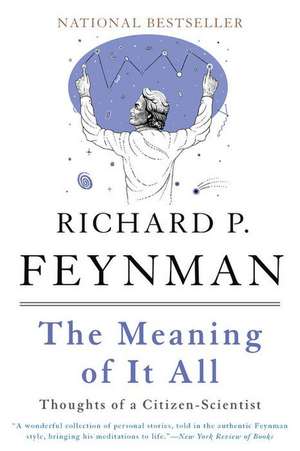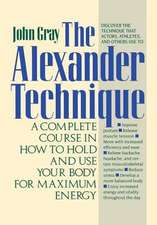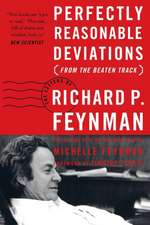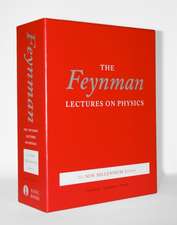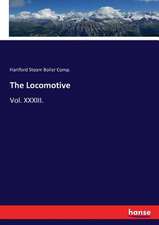The Meaning of It All: Thoughts of a Citizen-Scientist
Autor Richard P. Feynmanen Limba Engleză Paperback – 6 apr 2005
Many
appreciate
Richard
P.
Feynman's
contributions
to
twentieth-century
physics,
but
few
realize
how
engaged
he
was
with
the
world
around
him—how
deeply
and
thoughtfully
he
considered
the
religious,
political,
and
social
issues
of
his
day.
Now,
a
wonderful
book—based
on
a
previously
unpublished,
three-part
public
lecture
he
gave
at
the
University
of
Washington
in
1963—shows
us
this
other
side
of
Feynman,
as
he
expounds
on
the
inherent
conflict
between
science
and
religion,
people's
distrust
of
politicians,
and
our
universal
fascination
with
flying
saucers,
faith
healing,
and
mental
telepathy.
Here
we
see
Feynman
in
top
form:
nearly
bursting
into
a
Navajo
war
chant,
then
pressing
for
an
overhaul
of
the
English
language
(if
you
want
to
know
why
Johnny
can't
read,
just
look
at
the
spelling
of
“friend”);
and,
finally,
ruminating
on
the
death
of
his
first
wife
from
tuberculosis.
This
is
quintessential
Feynman—reflective,
amusing,
and
ever
enlightening.
Preț: 68.79 lei
Preț vechi: 93.08 lei
-26% Nou
Puncte Express: 103
Preț estimativ în valută:
13.16€ • 13.78$ • 10.96£
13.16€ • 13.78$ • 10.96£
Carte disponibilă
Livrare economică 11-25 martie
Livrare express 22-28 februarie pentru 39.88 lei
Preluare comenzi: 021 569.72.76
Specificații
ISBN-13: 9780465023943
ISBN-10: 0465023940
Pagini: 144
Dimensiuni: 134 x 216 x 14 mm
Greutate: 0.14 kg
Editura: BASIC BOOKS
Colecția Basic Books
ISBN-10: 0465023940
Pagini: 144
Dimensiuni: 134 x 216 x 14 mm
Greutate: 0.14 kg
Editura: BASIC BOOKS
Colecția Basic Books
Notă biografică
Richard P. Feynman was raised in Far Rockaway, New York, and received his Ph.D. from Princeton. He held professorships at both Cornell and the California Institute of Technology. In 1965 he received the Nobel Prize for his work on quantum electrodynamics. He died in 1988.
Descriere
Many appreciate Richard P. Feynman's contributions to twentieth-century physics, but few realize how engaged he was with the world around him—how deeply and thoughtfully he considered the religious, political, and social issues of his day. Now, a wonderful book—based on a previously unpublished, three-part public lecture he gave at the University of Washington in 1963—shows us this other side of Feynman, as he expounds on the inherent conflict between science and religion, people's distrust of politicians, and our universal fascination with flying saucers, faith healing, and mental telepathy. Here we see Feynman in top form: nearly bursting into a Navajo war chant, then pressing for an overhaul of the English language (if you want to know why Johnny can't read, just look at the spelling of “friend”); and, finally, ruminating on the death of his first wife from tuberculosis. This is quintessential Feynman—reflective, amusing, and ever enlightening.
